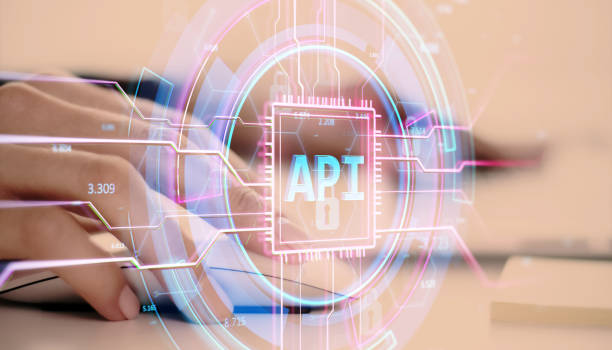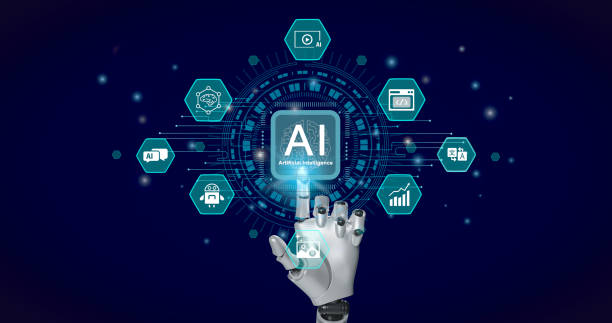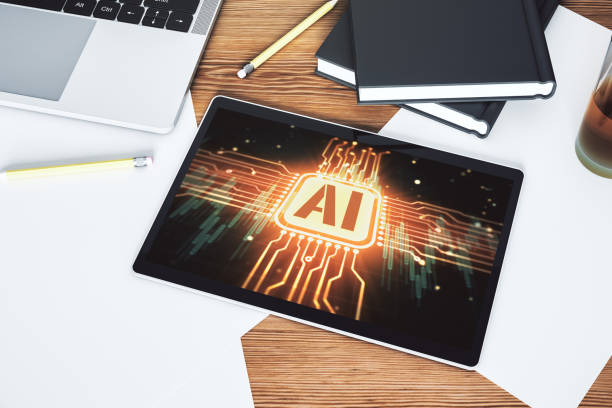What is Artificial Intelligence? Definition, History, and Basic Concepts

#Artificial_Intelligence (AI) is a branch of computer science that deals with building machines capable of performing tasks that typically require human intelligence.
These tasks include learning, problem-solving, pattern recognition, reasoning, and natural language.
The history of artificial intelligence dates back to the 1950s, when scientists like Alan Turing and John McCarthy sought to create intelligent machines.
Artificial intelligence‘s basic concepts include algorithms, data, and machine learning models.
Artificial intelligence is rapidly advancing and has profound impacts on our lives.
Machine Learning is one of the main sub-branches of artificial intelligence that allows machines to learn from data without explicit programming.
Deep Learning is also an advanced approach in machine learning that uses deep neural networks to analyze data.
#Natural_Language_Processing (NLP) enables machines to understand and process human language.
Artificial intelligence uses these concepts to perform various tasks.
In summary, artificial intelligence strives to enable machines to think and act like humans.
This technology has the potential to change our world and is currently applied in many industries and fields.
Do visitors leave your e-commerce site before making a purchase? Don’t worry anymore! With RasaWeb’s professional e-commerce website design services, solve the problem of not converting visitors into customers forever!
✅ Significant increase in conversion rates and sales
✅ Unique and attractive user experience
⚡ Contact us now for a free consultation!
Types of Artificial Intelligence: Approaches and Applications

Artificial intelligence is generally divided into two main categories: Narrow AI and General AI.
Narrow AI is designed to perform specific tasks and performs well in a limited domain.
Examples of Narrow AI include facial recognition systems, movie recommendation systems, and voice assistants like Google Assistant and Siri.
AI in these systems helps improve performance and efficiency.
In contrast, General AI seeks to create machines capable of performing any task a human can.
This type of AI is still in the research stages and is not widely available.
General AI requires the ability to understand, learn, and reason across various domains.
Some common approaches in artificial intelligence include machine learning, deep learning, neural networks, and evolutionary algorithms.
These approaches help machines learn from data and make decisions.
Artificial intelligence is applied in various industries, including medicine, finance, transportation, and manufacturing.
For example, in medicine, AI can help diagnose diseases, develop drugs, and provide personalized care.
In finance, AI can help analyze data, detect fraud, and manage risk.
And in transportation, AI can help develop self-driving cars and optimize routes.
Applications of Artificial Intelligence in Everyday Life

#Artificial_intelligence is increasingly present in our daily lives and helps us in many areas.
Some common applications of artificial intelligence include:
Voice Assistants Voice assistants like Siri, Google Assistant, and Alexa use artificial intelligence to understand and respond to our questions and commands.
These assistants can help us perform tasks such as setting reminders, playing music, and controlling smart home devices.
AI in these assistants helps improve response accuracy and speed.
Recommendation Systems Recommendation systems like Netflix and Amazon use artificial intelligence to suggest movies, products, and services tailored to our preferences.
These systems analyze data related to our viewing and purchase history to provide personalized recommendations.
AI in these systems helps increase customer satisfaction and sales.
Facial Recognition Facial recognition uses artificial intelligence to identify individuals in images and videos.
This technology is applied in various fields such as security, marketing, and customer service.
AI in these systems helps improve the accuracy and speed of facial recognition.
Machine Translation Machine translation uses artificial intelligence to translate text and speech from one language to another.
This technology is applied in various fields such as international trade, education, and travel.
AI in these systems helps improve the accuracy and fluency of translations.
Self-Driving Cars Self-driving cars use artificial intelligence to drive without human intervention.
This technology has the potential to reduce accidents, improve traffic, and increase transportation efficiency.
AI in these vehicles helps understand the surroundings and make safe decisions.
Overall, artificial intelligence is transforming our daily lives and helps us perform tasks faster, easier, and more efficiently in many areas.
| Voice Assistant | Manufacturer | Key Features |
|---|---|---|
| Siri | Apple | Integration with Apple devices, voice capabilities |
| Google Assistant | Access to Google information, integration with Android devices | |
| Alexa | Amazon | Integration with Amazon devices, diverse skills |
Advantages and Disadvantages of Using Artificial Intelligence

Using #artificial_intelligence has numerous advantages and disadvantages.
Some of the advantages of artificial intelligence include:
Increased Productivity Artificial intelligence can help automate repetitive and time-consuming tasks, thereby increasing productivity.
For example, in the manufacturing industry, AI can help with quality control, process optimization, and waste reduction.
AI in these cases helps improve performance and efficiency.
Error Reduction Artificial intelligence can help reduce human errors, thereby increasing quality and accuracy.
For example, in medicine, AI can help with more accurate disease diagnosis and the provision of more appropriate treatments.
AI in these cases helps improve people’s health and well-being.
Cost Reduction Artificial intelligence can help reduce costs by automating tasks, reducing human errors, and optimizing processes.
For example, in the customer service industry, AI can help answer customer questions, solve problems, and provide 24/7 support.
AI in these cases helps reduce operational costs.
Better Decision-Making Artificial intelligence can help improve decision-making by analyzing data, identifying patterns, and providing recommendations.
For example, in the financial industry, AI can help with risk analysis, market forecasting, and providing investment advice.
AI in these cases helps improve financial performance.
However, the use of artificial intelligence also has disadvantages.
Some of the disadvantages of artificial intelligence include:
Initial Costs Implementing AI systems can be costly, especially for small and medium-sized businesses.
Artificial intelligence requires investment in hardware, software, and training.
Data Dependency Artificial intelligence requires a lot of data to function correctly.
If the data is incomplete, inaccurate, or biased, AI can provide incorrect results.
Ethical Issues The use of artificial intelligence can raise ethical problems, especially in areas such as privacy, discrimination, and accountability.
Artificial intelligence must be designed and used in a way that respects human rights and values.
Unemployment Automating tasks using artificial intelligence can lead to unemployment, especially for repetitive and routine jobs.
Artificial intelligence should be accompanied by appropriate educational and employment policies to prevent social problems.
Are you dissatisfied with the low conversion rate of visitors to customers on your e-commerce site?
With professional e-commerce website design by RasaWeb, solve this problem forever!
✅ Increase visitor-to-customer conversion rate
✅ Create an excellent user experience and build customer trust
⚡ Get a free consultation
Impact of Artificial Intelligence on Jobs and the Labor Market

#Artificial_intelligence significantly impacts jobs and the labor market.
On the one hand, artificial intelligence can create new jobs, especially in areas such as AI development, data mining, and data analysis.
Artificial intelligence requires new skills that can create new job opportunities.
On the other hand, artificial intelligence can replace some jobs, especially those that are repetitive and routine.
Artificial intelligence can automate the tasks of these jobs, thereby reducing the need for human labor.
To prepare for the changes brought by artificial intelligence, individuals must learn new skills and adapt to new technologies.
Skills such as critical thinking, problem-solving, creativity, and interpersonal communication will become more important.
Artificial intelligence cannot easily replace these skills.
Governments and organizations must also adopt appropriate educational and employment policies to support individuals against the changes caused by artificial intelligence.
These policies should help individuals learn new skills and find new job opportunities.
Artificial intelligence must be managed in a way that benefits all members of society.
The Future of Artificial Intelligence: Predictions and Probabilities

The future of #artificial_intelligence is very bright and full of possibilities.
It is expected that artificial intelligence will be increasingly present in our lives in the coming years and will have profound impacts on our economy, society, and culture.
Artificial intelligence has the potential to solve many global problems.
Some predictions regarding the future of artificial intelligence include:
Further Advancements in Machine Learning and Deep Learning Machine learning and deep learning algorithms are expected to advance significantly and become capable of solving more complex problems.
Artificial intelligence in this area is rapidly developing.
Expansion of AI Applications in Various Industries Artificial intelligence is expected to find more applications in various industries such as medicine, finance, transportation, and manufacturing.
AI in these industries will help improve performance, reduce costs, and increase productivity.
Development of General Artificial Intelligence Although strong artificial intelligence is still in the research stages, significant progress is expected in this area in the future.
General artificial intelligence has the potential to change our world.
Ethical and Social Issues Related to Artificial Intelligence With the expansion of AI applications, ethical and social issues related to this technology will also become more important.
Artificial intelligence must be designed and used in a way that respects human rights and values.
To harness the opportunities arising from artificial intelligence and mitigate its risks, we must address the ethical and social issues related to this technology and adopt appropriate policies for its management.
Artificial intelligence must benefit all members of society.
| Year | Market Size (Billion USD) |
|---|---|
| 2023 | ~150 |
| 2025 | ~300 |
| 2030 | ~1,500 |
Challenges Facing the Development and Deployment of Artificial Intelligence

The development and deployment of #artificial_intelligence face numerous challenges.
One of the main challenges is the lack of high-quality and suitable data for training AI models.
AI models require a lot of data to function correctly and provide accurate results.
If the data is incomplete, inaccurate, or biased, AI models can produce incorrect results.
Artificial intelligence needs quality data to function correctly.
Another challenge is the shortage of skilled professionals in the field of artificial intelligence.
The development and deployment of AI systems require experts with the necessary knowledge and skills in areas such as machine learning, deep learning, and data analysis.
The shortage of these specialists can slow down the development and deployment of artificial intelligence.
Artificial intelligence needs skilled professionals to be properly developed.
Ethical and social issues are also important challenges in the development and deployment of artificial intelligence.
The use of artificial intelligence can create issues such as privacy, discrimination, and accountability.
Artificial intelligence must be designed and used in a way that respects human rights and values.
Artificial intelligence must benefit all members of society.
Furthermore, security issues are also a significant challenge in the development and deployment of artificial intelligence.
AI systems can be vulnerable to cyberattacks and exploited.
Artificial intelligence must be designed to be resistant to cyberattacks and protect sensitive information.
Artificial intelligence must be secure to function correctly.
Ethical Considerations in the Design and Use of Artificial Intelligence

In the design and use of #artificial_intelligence, ethical considerations are crucial.
One of the main considerations is to ensure that artificial intelligence operates fairly and without discrimination.
AI algorithms can be inadvertently biased if the data used to train them is biased.
Artificial intelligence must be designed to reduce discrimination and promote fairness.
Privacy is another important consideration in the design and use of artificial intelligence.
AI systems can collect and process a lot of personal information.
This information must be protected in a way that preserves individuals’ privacy.
Artificial intelligence must be designed to respect privacy.
Transparency and accountability are also important considerations in the design and use of artificial intelligence.
People should know how AI systems make decisions and what information is used for these decisions.
Furthermore, it must be clear who is responsible for decisions made by AI systems.
Artificial intelligence must be transparent and accountable.
Moreover, the impact of artificial intelligence on jobs and the labor market must also be considered.
Automating tasks using artificial intelligence can lead to unemployment.
Artificial intelligence must be managed in a way that benefits all members of society and prevents social problems.
Artificial intelligence should be used in a way that helps create new jobs and improve working conditions.
Did you know that 94% of users’ first impressions of a business are related to its website design? With professional corporate website design by **RasaWeb**, turn this first impression into an opportunity for growth.
✅ Attract more customers and increase sales
✅ Build credibility and trust in the audience’s eyes⚡ Get a free website design consultation!
How Can We Prepare for a Future with Artificial Intelligence?

To prepare for a future with #artificial_intelligence, we must learn new skills and adapt to new technologies.
Skills such as critical thinking, problem-solving, creativity, and interpersonal communication will become more important.
Artificial intelligence cannot easily replace these skills.
Artificial intelligence needs human skills.
Also, we must pay attention to artificial intelligence and machine learning education.
Learning these skills can help us remain competitive in the job market and find new job opportunities.
Artificial intelligence needs skilled professionals.
Moreover, we must also consider the ethical and social issues related to artificial intelligence.
We should be aware of the impact of artificial intelligence on society and the economy and be prepared to solve potential problems.
Artificial intelligence must benefit all members of society.
Governments and organizations also play an important role in preparing individuals for a future with artificial intelligence.
They must adopt appropriate educational and employment policies to support individuals against the changes caused by artificial intelligence.
These policies should help individuals learn new skills and find new job opportunities.
Artificial intelligence must be managed in a way that benefits all members of society.
Resources and Tools for Learning Artificial Intelligence

For learning #artificial_intelligence, numerous resources and tools are available.
Some of these resources include:
Online Courses Numerous online courses in artificial intelligence and machine learning are offered by reputable universities and institutions.
These courses can help you learn the basics of artificial intelligence and acquire the necessary skills to develop AI systems.
Artificial intelligence can be learned online.
Books Numerous books on artificial intelligence and machine learning are available that can help you deepen your knowledge in this field.
These books can explain complex AI concepts in simple language and help you better understand this technology.
Artificial intelligence can be learned through books.
Machine Learning Platforms Machine learning platforms like TensorFlow and PyTorch are powerful tools that allow you to develop and train AI models.
These platforms have numerous libraries and tools that can simplify the AI development process.
Artificial intelligence can be developed using machine learning platforms.
Machine Learning Competitions Participating in machine learning competitions like Kaggle can help you test your skills in artificial intelligence and compete with other experts in the field.
These competitions provide excellent opportunities for learning and advancement in artificial intelligence.
Artificial intelligence can be learned through machine learning competitions.
Online Communities Joining online artificial intelligence communities can help you connect with other experts in the field and benefit from their experiences.
These communities are great places to ask questions, share ideas, and learn from others.
Artificial intelligence can be learned through online communities.
Frequently Asked Questions
| Question | Answer |
|---|---|
| What is Artificial Intelligence? | It is the simulation of human intelligence in machines programmed to think like humans and imitate their actions. |
| What are the main branches of Artificial Intelligence? | They include machine learning, deep learning, natural language processing, computer vision, and robotics. |
| What is Machine Learning? | It is a branch of artificial intelligence that focuses on enabling systems to learn from data and identify patterns without explicit programming. |
| Give examples of AI applications in our daily lives. | Voice assistants (like Siri and Alexa), recommendation systems in Netflix and Amazon, self-driving cars, and facial recognition software. |
| What is Deep Learning? | It is a subset of machine learning that uses multi-layered (deep) artificial neural networks to process large amounts of data. |
| What is Natural Language Processing (NLP)? | It is a branch of artificial intelligence that focuses on enabling computers to understand, interpret, and generate human language. |
| What are some ethical concerns related to Artificial Intelligence? | They include data bias, privacy, job displacement, and accountability in case of errors. |
| What are the main benefits of Artificial Intelligence? | Increased efficiency, improved decision-making, automation of repetitive tasks, and discovery of complex patterns in data. |
| How is Artificial Intelligence used in healthcare? | In disease diagnosis, drug discovery, medical image analysis, and personalized patient care. |
| How do you see the future of Artificial Intelligence? | It is expected to continue evolving rapidly, affecting all aspects of human life, from industry to education and entertainment. |
And other advertising agency RasaWeb services in the field of advertising
- Smart UI/UX: An effective tool for digital branding by optimizing key pages.
- Smart Conversion Rate Optimization: Designed for businesses looking to attract customers through intelligent data analysis.
- Smart Marketing Automation: A professional solution for online growth focusing on custom programming.
- Smart Marketing Automation: An effective tool for user engagement by customizing the user experience.
- Smart Advertising Campaign: Professional optimization for user engagement using precise audience targeting.
And hundreds of other services in the field of internet advertising, advertising consultation, and organizational solutions
Internet Advertising | Advertising Strategy | Advertorial
Resources
Applications of Artificial Intelligence in Industry
Latest Developments and News in Artificial Intelligence
Impact of Artificial Intelligence on Daily Life
Complete Guide to Artificial Intelligence for Beginners
? To elevate your business in the digital world and reach the peak of success, RasaWeb Afarin Digital Marketing Agency is with you, offering comprehensive and intelligent services.
Our expertise lies in increasing your visibility, attracting target customers, and sustainable growth for your brand. From professional website design and SEO to social media management and advertising campaigns, you will find everything you need to shine online at RasaWeb Afarin.
With an experienced and dedicated team, transform the future of your business in the online space. Contact us today for a free consultation.
📍 Tehran, Mirdamad Street, next to the Central Bank, South Kazeroun Alley, Ramin Alley, No. 6



